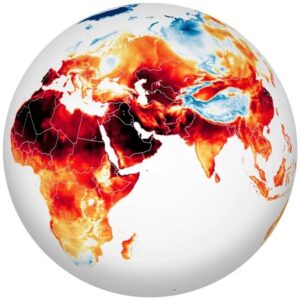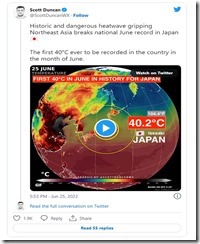What is a heatwave?
A heat wave, or heatwave, is a period of unusually extreme heat that may also be accompanied by significant humidity, particularly in nations with oceanic climates. Despite varying definitions, heat wave events are typically assessed in relation to the local climate and the average temperatures for the time of year. If temperatures are higher than someone from a hotter environment would consider normal for that region, then it can be considered a heatwave.
When heat wave events are accompanied by high humidity, they become more hazardous. The heat index calculates the temperature and humidity combination.
Extreme heat can make other forms of calamities more likely. Heatwave events make drought worse, and wildfires can be sparked by hot, dry weather. The urban heat island effect is a phenomenon where temperatures in urban centres can be 1 to 7 °F hotter than in outlying areas as a result of buildings, roads, and infrastructure absorbing heat.
The impact is greatest during the day, although cities can remain significantly hotter than the surrounding areas overnight due to the infrastructure’s delayed release of heat or an atmospheric heat island. People, ecosystems, and the economy are all at risk as a result of the nation’s rising temperatures.
Globe displaying the regions impacted by this heat wave Image: NASA Earth Observatory.As a result of greenhouse gas emissions causing global warming, heatwave frequency and intensity are both progressively rising everywhere. The past eight years have been the warmest eight years on record, and June 2022 was the warmest June on record for land since data have been kept since the mid-1800s, according to Berkeley Earth.
Numerous intense heatwaves in 2022 broke many temperature records in Asia, America, Europe, Northern Africa, and Oceania. A summary of the world’s record-breaking heat waves in 2022 is given in this article.
Top 10 Extreme Heat Waves Reports
1. The United Kingdom
A record-breaking heatwave struck the UK in July 2022. On July 15, the London authority issued the nation’s first-ever red alert for severe heat for areas of England.
The UK achieved its highest temperature ever on July 19, 2022 (Tuesday), just before 12:00 GMT, when it reached 40.2°C (104.4°F) at London’s Heathrow Airport. Coningsby, 130 miles north of London, reported a new national temperature data of 40.3°C (104.5°F) a short time later.
For the first time ever, the temperature in the United Kingdom surpassed 40 °C. The previous record high was in 2019, at 38.7 °C (101.6 °F). Near London, average high summer temperatures typically range from 20 to 25 °C (68 to 77 °F). The heaviest heatwave ever to hit the UK is uncomfortable for inhabitants and residents because only about 3% of residences have air conditioning.
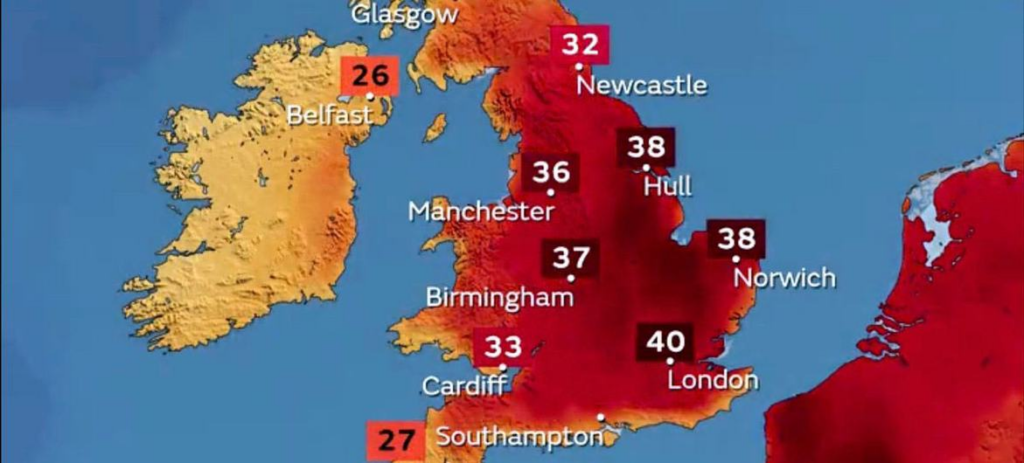
2. The United States
Numerous states in the US are expected to experience historically high temperatures in May 2022. In the mid-Atlantic and northeast, temperatures were between 20- and 30 degrees Fahrenheit above average for the time of year. As a result, a historic heatwave hit the Midwestern and South-eastern United States on June 10, 2022. Phoenix set a record-high temperature of 45.6 °C (114 °F). The temperature in Death Valley increased to 51 °C or 123 °F. It is the first time that a high temperature has persisted for two days in a row. However, it is second to the highest record.
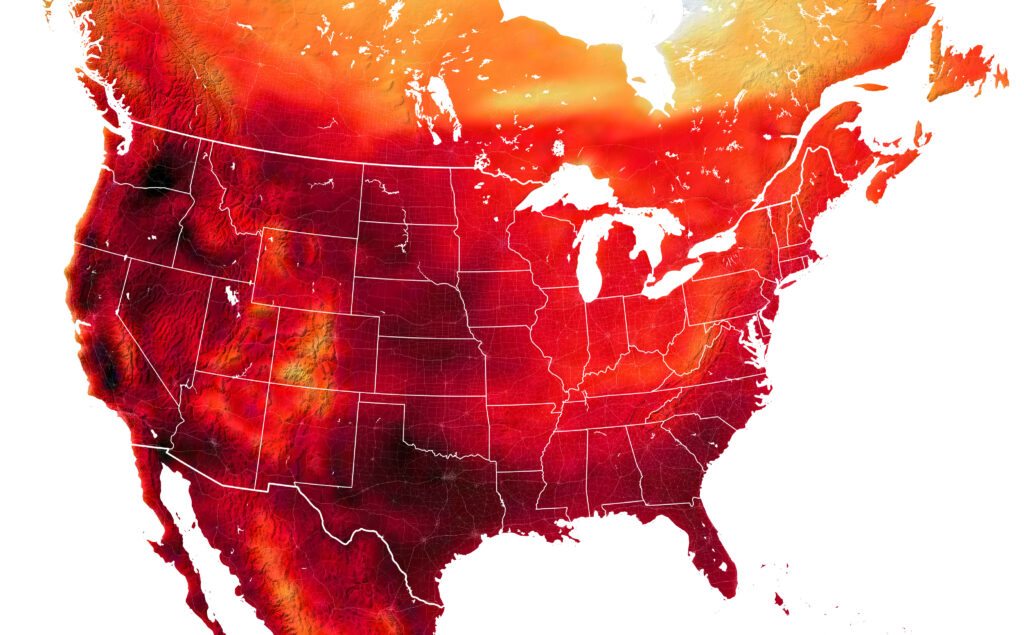
3. China
Since establishing its national meteorological measurements in 1961, China has been experiencing the most prolonged and heaviest heatwaves on record this summer, beginning in the middle of June 2022. About 70 days of the heatwave saw temperatures above 40°C (104°F) in numerous provinces and cities. The highest daily temperature at more than 130 national weather stations has matched or surpassed the previous peak. China’s landmass, approximately 5 million square kilometres, suffers from extreme heat and/or severe drought. The heatwave has hampered crop development, endangered cattle, and impacted the electrical grid in some places.
The hottest temperature recorded was 44.2°C (111.6°F) on June 25, 2022, in Lingshou, Hebei Province, China.
With a temperature of 40.9 °C (105.6 °F), Shanghai, the largest city in China, experienced its equal warmest day since records began in 1873 on July 13, 2022. As a result, Shanghai issued its first summertime red heat alert on July 10, 2022. (Sunday).
The highest temperature ever recorded in China outside of the arid region of Xinjiang was 45°C (113°F) on August 18 in Chongqing, Sichuan province. The most extraordinary minimum temperature ever recorded in China in August was reached on August 20 when the temperature in the city didn’t drop below 34.9°C (94.8°F). A maximum of 43.7°C (110.7°F) was recorded.
The worst heatwave ever recorded in China. Image: New Scientist

4. Argentina
An unprecedented heatwave struck various South American nations in January 2022, with Argentina feeling the brunt of it the most. The hottest temperature ever recorded was 45 °C (113 °F) on January 12, 2022, in Rivadavia, Argentina. The second-highest temperature recorded in the country’s capital, Buenos Aires, since records began in 1906, was 41.1 °C (106.0 °F). Numerous additional stations in Argentina also recorded the warmest temperature ever.
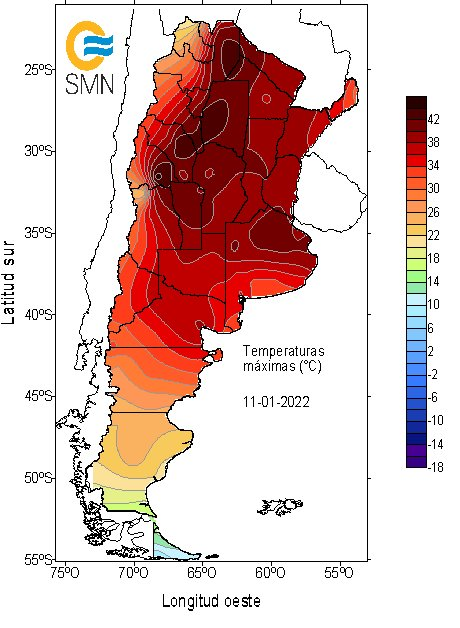
5. Australia
A strong heatwave struck Western Australia on January 13, 2022. The temperature at the coastal city of Onslow matched the Southern Hemisphere’s record high temperature of 50.7 °C (123.3 °F), which was established at Oodnadatta Airport in South Australia on January 2, 1960, 62 years earlier. According to local media, Onslow experienced an average high temperature of 36.5°C in January.
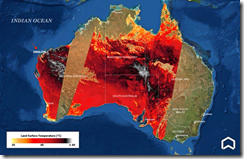
6. India and Pakistan
A severe and protracted heatwave will affect north India and Pakistan in March–April 2022, with some regions of Delhi seeing record-breaking temperatures of 49.2°C (120.5°F). These locations experience temperatures that are 5 to 7 °C above average. According to the Indian Meteorological Department, the heatwave’s duration is essentially unprecedented, even though the number is not a record. A similar heatwave wasn’t observed for 122 years.
Jacobabad, Pakistan, and Nawabshah, Pakistan, recorded temperatures of at least 49.5 °C on May 1, 2022, possibly the highest temperature ever recorded for the Northern Hemisphere this year.

India heatwave
Photo Showing Pakistan heatwave
7. Antarctica and Arctic Circle
Record-breaking heat wave events simultaneously hit the Arctic and Antarctic in mid-March 2022. The Italian-French research station Concordia, 3,200 meters above sea level in the centre of Antarctica, reported an all-time high of -11.8°C (110.8°F) on Friday, March 18, 40C above seasonal averages. The Vostok station in East Antarctica, operated by Russia, also reached a provisional high of -17.7°C, which is 15°C warmer than the previous record for March, which stood at -32.6°C/-26.9°F.
The Arctic had a similar hot weather pattern meanwhile. Norway’s Svalbard reported a new maximum temperature of 3.9°C, which is 30°C higher than March’s. Norilsk, Russia, saw its hottest day on record on June 23, 2022, when the temperature soared to 32°C (89.6°F).

8. Japan wave Events
Japan experienced its hottest heatwave in 150 years towards the end of June 2022. The hottest temperature ever recorded in Japan was 40.2°C (104.4°F) on June 25, 2022, in Isesaki, a city located about 50 miles northwest of Tokyo. Since records have been kept since 1875, this set a national heat record for June.
Highest ever recorded heatwave in Japan
9. Northern Africa
A 40-year record of heat wave events was broken on July 13, 2022, when the temperature in Tunis, the country’s capital, surpassed 48°C (118°F).
10. Portugal
A record July temperature of 47 °C (116.6 °F) was set in Portugal on July 14, 2021. As a result, the national meteorological service IPMA has declared a high fire hazard for the majority of the nation, according to BBC News.
Resilience Strategies for Intense Heat Wave Events
Climate change contributes to more frequent, severe, and longer heat waves worldwide, especially during the summer. For example, the number of heatwaves observed in 2011 and 2012 was triple the long-term average and required intense planning for economic, health and environmental risks.
As a result, some methods have been proposed to increase resistance to extreme heat.
- Identify at-risk groups and develop heat preparedness plans that consider all residents, including operating cooling centres during excessive heat and enacting occupational heat stress regulations.
- Putting up cool, green roofs and cool pavement to lessen the impact of the urban heat island.
- Planting trees to produce shade and evapotranspiration to cool the air
- Pursuing energy efficiency to lower grid demand, particularly during heat waves.
